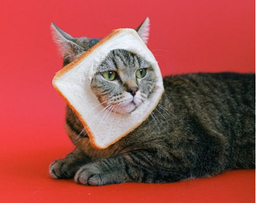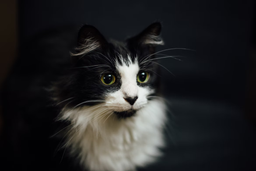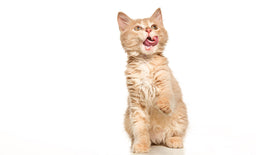Can cats eat bacon? Resolving the conundrum
Cats are obligate carnivores, and bacon is meat, so it makes perfect sense that cats can eat it, right? The truth is not so black and white. Bacon has some nutritional value, but the product carries specific health risks to cats as well as humans.
In this article, Untamed answers the following burning questions:
- Can cats eat bacon?
- What are the risks involved?
- Does it matter what type of bacon you choose?
- What are healthier alternatives to bacon?
- Is pork bad for cats?
- What can cats not eat at all?

Where’s the bacon, human?! I don’t see it!
Source: Freepik
Should cats eat bacon?
Cured in salt, raw, cooked, or fried, humans find bacon delicious, so there's no reason to assume your feline won't like it, right? Unfortunately, cats react badly to the high fat and sodium content in bacon.
Cats need up to 20% fat in their daily food intake, but bacon exceeds that value and doesn’t provide any additional nutritional value. Fish, crustaceans, and lean meats contain the right amount of fat and plenty of protein, vitamins, and minerals.
Cats usually love bacon, and cat parents must take precautions to keep the product out of paw’s reach.
Why is salty food bad for cats?
Salt is toxic to cats, and veterinarians say that one-tenth of a teaspoon can cause poisoning in most cats.
Symptoms of salt toxicosis include:
- Nausea and vomiting
- Increased thirst
- Excessive urination
- Diarrhoea
- Lethargy
- Tremors
- Seizures
- Difficulty breathing
- Disorientation
- Coma
- Death
If you left some unsupervised bacon (or other sodium-rich deli meats like ham) and noticed it’s gone, and your cat isn’t feeling well, take them to the veterinarian as soon as possible.
Not all bacon is the same, is it?
Bacon can be made from various meat sources and processed in several ways, so let's check out if there is a difference among the available products.
Can cats eat raw bacon, or does it have to be cooked?
Let’s compare the nutritional values of raw and cooked bacon:
|
Preparation method |
Grams of fat per 100 grams of the product |
Approximate caloric value per 100 grams of the product |
|
Cooked |
42 g |
500 kcal |
|
Raw |
40 g |
417 kcal |
|
Microwaved |
34 g |
476 kcal |
|
Pan-fried |
42 g |
541 kcal |
|
Baked |
43 g |
548 kcal |
As per the table above, processing methods seem to spike up the calories, but is it good to feed your cat raw pork, chicken, or other meat?
Some specialists claim that a raw diet beats any other, but the truth is that improperly stored meat (or raw eggs) could cause the following health problems for your cat:
|
Type of condition |
Culprits |
|
Bacterial infections |
|
|
Parasites |
|
Avoid giving raw food to your feline because raw products from the human food supply chain are not the same as fresh prey cats kill in the wild. Cross-contamination is also possible, so cooking your pet's food keeps the whole family safe from bacteria and other pathogens.
Different meat sources
Is bacon made of beef, lamb, turkey, or plants less harmful than the original kind? Before we start comparing them, let’s get vegan bacon off the table. Cats, as obligate carnivores, lack the enzymes necessary to break down and absorb plant protein. To make matters worse, the most popular vegan bacon is made of soya—a potential allergen and the cause of stomach upsets in many cats.
Let’s compare non-traditional animal-based bacon products:
|
Type of bacon |
Grams of fat per 100 grams of the product |
Approximate caloric value per 100 grams of the product |
|
Beef bacon |
37 g |
480 kcal |
|
Uncured lamb bacon |
24 g |
320 kcal |
|
Turkey bacon |
28 g |
382 kcal |
There’s a noticeable difference in the fat content and caloric value compared to pork bacon, but these options are still too fatty and undergo heavy processing. That's why you should refrain from giving them to your cat.
Can cats have bacon as a snack?
Cats can enjoy tiny amounts of bacon as a snack. You can also use bacon to entice your feline’s appetite on days when they refuse to eat. Veterinarians recommend keeping treats up to 4% of your furry friend’s daily intake. For an average-sized cat, the daily calorie intake ranges between 192 kcal and 280 kcal, meaning your feline can have a thin slice of bacon per day. Larger breeds, such as Ragdolls or Maine Coons, and more active ones, like Bengals, can enjoy up to one half of a slice more.
Practice extra caution with snacks. If your kitty had any (such as ham, cheese, and other dairy products) that day, skip the bacon because your kitty could:
- Have a caloric surplus and start gaining weight
- Experience stomach upsets or other health problems
- Get sodium poisoning (from other sodium-rich snacks)
Conditions caused by feeding cats bacon too often
Did your cat get their paws on bacon but doesn’t show signs of stomach upset and dehydration? The coast is still not clear because the long-term consequences may include:
- Obesity
- Dehydration
- High blood pressure
- Clogged blood vessels
If you’ve fed your cat bacon frequently, you should book an appointment with your vet to check up on your cat’s health.
You can offer your cat some bacon only if it’s:
- Animal-sourced
- Bite-sized
- Cooked
- Served as a treat, not a meal
Cats love bacon because of its aroma, crunchy texture (which resembles dry food), and fat content. If your cat has the bacon craze and you want to offer them some as a reward, one thin slice is more than enough for the entire day.

Is that unsupervised food on the counter? Hmm… interesting.
Source: Freepik
What do veterinarians do with bacon fans?
If you take your kitty to the vet because they had a lot of bacon recently, the vet will perform the following tests:
- Physical examination
- Chemical blood profile
- Complete blood count
- Urinalysis
The vet will also ask you about your furry friend’s food allergies and recent diseases. The test results will show your cat’s sodium and cholesterol levels, while the answers you provide might indicate any food allergies or sodium poisoning.
You should refrain from giving your cat bacon until the test results arrive. Depending on the test results, your vet will suggest a special diet and appropriate treatment (if necessary).
If your cat had vegan bacon or a dish containing common allergens, your vet could perform an allergy test and recommend a hypoallergenic diet.
To pork or not to pork? Is all pork bad?
Pork is not necessarily bad but should be fed in moderation, cooked thoroughly, and served without bones. All pork cuts are higher in fat and sodium than every other type of meat, and splinters of large bones could cause your cat to choke or rupture their digestive organs.
If in doubt when choosing food for your furry friend, keep in mind that fish and poultry are way better for felines than any red meat. Wild cats hunt and eat smaller animals, like mice, tiny birds, and insects, which are less fatty. Stick to lean meat and seafood, and your cat won’t have to struggle with obesity or blood pressure issues.
What’s the deal with preservatives in bacon and other processed meat?
Most processed meat, including bacon, contains sodium nitrite and potassium nitrite. These chemical compounds are the reason processed meats are pink and considered Class 1 human carcinogens. Does that apply to cats?
Nitrites are used as preservatives and bacteria killers in cat food, too. There have been speculations, and a few scientific publications regarding the harmful effect nitrites have on cats, but feline specialists haven’t come to a conclusion yet.
Until the conundrum is resolved, it’s best to opt for homegrown and home-cured meats. That way, you have complete control over the freshness and quality of the meat as well as preservatives and additional sodium (if any) used during the production and curing of the meat. You can also buy natural meat products from local organic and free-range farms.
What kind of meat benefits cats?
Cats benefit from all kinds of meat, but poultry is very popular among cat parents because of its naturally low sodium and fat content.
Some feline favourites include:
- Chicken
- Duck
- Turkey
Let your cat try a tiny bit of organ meat, for example, chicken liver, because it’s exceptionally rich in nutrients. Keep the portions small because too much of it could cause vitamin A poisoning.
Red meat, like beef and lamb, are an excellent source of protein and fat but can cause stomach upsets in more sensitive felines.
Cooked fish and crustaceans are an excellent source of healthy fatty acids, vitamins, and minerals, so you can safely treat your cat with some:
- Mackerel
- Prawns
- Sardines
- Salmon
- Shrimp
- Tuna
Rabbit (and other game) meat is a good source of fatty acids, vitamins, and minerals, and you can include it in your cat’s menu from time to time.
Check up on your kitten every time you introduce a novelty in your cat’s diet because of potential allergic reactions, with beef being the most common allergen among meat.

The audacity of this human! Even the dog got some bacon, and I can’t have any!
Source: Freepik
Why is meat the staple of a healthy feline diet?
The amazing feline organism can produce many essential nutrients on its own, but some must be supplemented through food. Some of these nutrients, such as vitamin A, are found in meat, vegetables, fruits, milk, and dairy products, none of which are appropriate for cats except for the first one—meat. Essential amino acids, such as taurine and arginine, are only found in meat.
Untamed—the perfect combo of healthy and tasty!
Feline nutrition can be confusing, so choosing high-quality products from reliable sources is the safest bet! Untamed vet-formulated recipes ensure your furry friend has all they need to thrive—inside and out—with no required effort on your part!
Cat parents who let their feline companions try Untamed report the following positive changes:
|
Timeline |
What changed? |
|
After one week |
|
|
After two months |
|
|
After four months |
|
|
After six months |
|

Maybe… Maybe I don’t need bacon, after all.
Image (c) Untamed
What makes Untamed special?
Untamed is changing the cat food industry, one tin at a time. We strive to ensure and maintain transparency of ingredients and our food production process. Cat parents who trust us do so because we:
- Practice ethical cat food production and eco-friendly delivery methods
- Use only the finest human-grade ingredients for our products
- Deliver double the protein compared to the industry standard
Whether you’re a new cat parent looking for the best first solid food for your kitten or want to find healthier products for your adult or senior feline, Untamed's tailor-made dishes are your go-to. Bengal, Ragdoll, Persian, Siamese, Maine Coon, or British Shorthair—we’ve earned the trust of cats of all breeds!
If you don’t have the time to cook for your feline but want them on a healthy diet—don’t fret! Our products don’t require defrosting or any other type of extra prep.
Sounds good? Try our taster pack and let us know how your furry friend feels about it!

Mum, can we order more?
Image (c) Untamed
How to order Untamed
Ready to order the best cat food online? To receive your first Untamed delivery:
- Complete our questionnaire
- Choose a meal plan
- Confirm your order
We take the word convenience to the next level by offering one-day delivery and allowing you to modify, delay, pause, or cancel your order at any time. Check out our cat food subscription box today!
Help! My cat won’t eat their food while I’m eating bacon!
Are you dealing with a finicky cat? If your feline rejects their super healthy wet food and demands your bacon, here's what you can do:
- Warming up your cat’s food—Your cat watches you bake or pan-fry your bacon, so if you warm their food and make it look like you’re doing some extra prep, you might convince them that their food is equally good
- Spicing up your furry friend’s food—If make-believe food prep doesn’t work, you can try adding water, fish flakes, vitamin powder, low-sodium chicken soup, or bone broth to their kibble or wet food to enhance its taste
- Eating at different times—If you’re scared that your cat might reject their food until they have a bite of your crispy deliciousness, serve their meal first. You will probably have to deal with war cries once you start eating, but at least you’ll know they ate
- Crushing some cat biscuits into their jelly or gravy—Maybe your furry friend likes the crunch of bacon, so give them something to chew
Foods that are harmful to cats
Sometimes, you might wish to share all your snacks with your furry friend, but human food is, more often than not, dangerous to cats.
Some of the products you must keep out of your cat’s reach include:
|
Food category |
Items |
|
Fruits containing citric acid |
Oranges, grapefruits, lemons, limes, and tangerines |
|
Sugar, sweeteners, and sugar-rich foods |
Candy, xylitol (toxic), and stevia |
|
Foods containing cellulose |
Sweet corn, black beans, lima beans, brussels sprouts, avocados, sweet potatoes, broccoli, turnips, kidney beans, figs, nectarines, and apricots |
|
Relaxants and stimulants |
Coffee, energy drinks, and alcoholic beverages |
|
Cocoa powder and products containing it |
Chocolate, cakes, hot cocoa, and chocolate milk |
|
Allium vegetables |
Chives, onions, garlic, and scallions |
|
Milk and dairy products |
Whole and skimmed milk, lactose-free milk, cheese, and yoghurt |
What else should cats not eat?
Despite being nutritionally rich for humans, fruits, veggies, and grains are bad for cats. Felines are obligate carnivores and lack the enzymes necessary to break down and absorb the nutrients. If ingested, these foods are likely to cause stomach upsets, some even poisoning.
If your cat is stubborn and demands a bit of your food, here’s what you can give them in small amounts:
|
Fruit |
Veggies |
Grains |
|
|
|
*Should be avoided when a cat has urinary tract problems (including cystitis, struvite crystals, and kidney disease) because of high alkaline content. Must be cooked before serving.
**These grains must be mashed before serving.
Keep in mind that even safe fruits, veggies, and grains cannot replace meat and can only work as occasional treats. The foundation of a healthy diet for all felines are regular meals containing meat.
Check out our other guides to what cats can or cannot eat:
|
|

![Best food for Ragdoll cats in the UK [Broken Down]](http://untamed.com/cdn/shop/articles/featured_best_food_for_ragdoll_cats_uk.jpg?v=1646818249&width=256)

